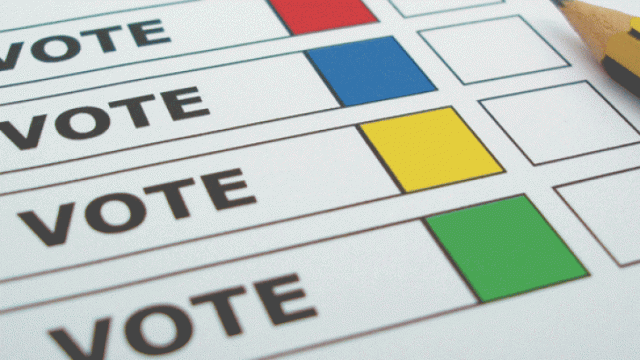Search
Democracy Links
Member's Off-site Blogs
tick a box .....

Tick a box every few years …..
Australian politicians and media commentators – Liberal and Labor, conservative and liberal alike – love telling us about their democracy and how great it is writes Ben Hillier in Red Flag. The thing is, they seem to be turning people off it.
The annual Lowy Institute Poll of social attitudes has again found a low level of support for democracy among young people. Just 42 percent of people 18-29 years old agree with the statement “Democracy is preferable to any other kind of government.” One in five thinks that it doesn’t matter what kind of government we have; one in three agrees that, sometimes, a non-democratic government could be preferable.
Support for democracy is higher at 60 percent of the total population. But that still leaves two out of every five people disagreeing with the above statement. Those respondents were asked the reasons. Three-quarters agreed that “Democracy is not working because there is no real difference between the policies of the major parties” and “Democracy only serves the interests of a few and not the majority of society.” Sixty-four percent agreed in some way with the statement “I have become disillusioned with Australian politics and think another system might work better.”
In other words, it’s not really democracy itself that is the cause of its rejection, but what people (rightly) see as the sham of democracy as it is currently practised.
More disturbing is the finding that almost 10 percent of the population agree that “A more authoritarian system where leaders can make decisions without the processes of democracy achieves better results”; a further 16 percent have sympathy with that statement. The survey doesn’t indicate which social classes the respondents come from. You could expect that many in the upper and middle classes who hate trade unions, street demonstrations and social welfare would always prefer dictatorship.
But it might also be true that capitalist democracy is such a mess that, in one of the most affluent and stable countries in the world, several million people actually prefer authoritarianism because they think it would be more responsive to the needs of the people.
The broader findings tally with other surveys and indicators showing high levels of indifference towards or disaffection with what passes as “official politics”. The Australian National University’s Trends in Australian political opinion survey finds that fewer and fewer people bother discussing election campaigns or try to convince others to vote.
Australian Electoral Commission figures show that the federal minor party vote has steadily climbed from the 1970s to be one in five votes in the House and one in three in the Senate. Along with that expression of dissatisfaction with the major parties, the informal vote has risen and the voter turnout declined. If the 1990s average for these had been maintained, there would have been some 700,000 extra valid votes cast at the 2013 election. That’s about the same number of votes the Palmer United Party received in the Senate.
Yet those who make a living from official politics – the so-called “political class” of elected reps, policy experts, administrators, advisors, journalists etc. – have become so detached that anyone not part of their elite club is deemed illegitimate. Up in Canberra the world is turned on its head.
The battering that Ricky Muir of the Motoring Enthusiasts Party received because he stuttered and stumbled in front of the camera during his first TV interview this month was instructive. Muir’s crime was just being a punter. The interviewer, Mike Willesee, didn’t seem to give a rat’s arse about what the Senator-elect actually stood for – his main concern was whether Muir was sufficiently media savvy.
By contrast, lying, greasy, spin doctoring political warriors for the rich often get a free media ride simply because they have learned how to play a straight bat or have cultivated charm or wit enough to impress their well-to-do “interrogators”.
The pervasive lack of self-reflection on the part of those in power was illustrated by acting Prime Minister and National Party leader Warren Truss in mid-June: “Those who throw away their vote in some kind of protest”, he sooked in reference to the high minor party vote, “are in fact ignoring their obligations to their democracy but also putting their country at risk.” He may as well have said “let them eat cake”.
People are right to be turned off by the rule for the rich club that is Australian politics as conducted by the major parties. If that is “putting their country at risk”, it’s well and good.
What we need, however, is not to turn away from democracy and politics, but to reclaim them. We need the politics of class struggle, of mass resistance to the corporate and parliamentary elite. And we need real democracy – in which the working class decides how the economy and society is run. That’s a concept that the politicians in Canberra, and the press gallery drunk off the fumes of the former’s power, will never comprehend.
Is this what democracy looks like?
- By John Richardson at 23 Jun 2014 - 1:32pm
- John Richardson's blog
- Login or register to post comments
Recent comments
51 min 1 sec ago
17 hours 34 min ago
17 hours 37 min ago
18 hours 37 min ago
20 hours 41 min ago
21 hours 22 min ago
23 hours 46 min ago
1 day 1 hour ago
1 day 1 hour ago
1 day 9 hours ago